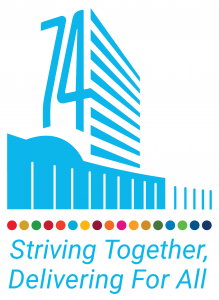
- This event has passed.
High-level Dialogue on Desertification, Land Degradation and Drought
Given recent developments related to the global public health emergency (COVID-19), and guided by the risk assessments carried out by the UN Secretariat, we have decided to postpone the convening of this event.
(Resolution 74/220 and decision 74/551)

High-level Dialogue on Desertification, Land Degradation and Drought
9 June 2020. United Nations Headquarters. New York
Background
Land is the foundation of our societies. It allows economies to grow and prosper. Land provides more than 50% of the total value of all ecosystem services. This finite resource is under existential threat. Productive land is a cornerstone to poverty eradication, zero hunger, energy for all, food security and environmental health.
Each year, more than 12 million hectares are lost to land degradation, desertification and recurrent droughts. More than half of all agricultural land is already affected by degradation. Climate change is further exacerbating this situation, with many regions becoming drier, suffering more frequent and prolonged droughts. Indeed, climate-induced water stress and land degradation could lead to loss of more arable land in the coming years, plunging millions of farmers into poverty and contributing to forced migration and conflict.
Despite being a challenge of international significance, DLDD issues for a very long time were perceived as regional or local only. However, recent developments in DLDD are quite encouraging. The inclusion of desertification, land degradation and drought (DLDD) issues among the Sustainable Development Goals (SDG15.3) symbolized the international community’s strong commitment towards a land degradation neutral world by 2030. The General Assembly also recently identified that “land-based solutions, as part of nature-based solutions, constitute promising options to evaluate and consider in connection with sequestering carbon and enhancing the resilience of people and ecosystems affected by DLDD as well as adverse effects of climate change”. Over the UN Decade for Deserts and the Fight against Desertification (2010-2020), some results have been achieved, however, challenges remain. These challenges are magnified in the context of achieving the SDGs.
As of today, 123 countries have set or committed to set their Land Degradation Neutrality (LDN) targets. LDN is a paradigm shift in land management policies and practices. It is a unique approach that inter alia counterbalances the expected (unavoidable) loss of productive land, with the recovery of degraded areas. It strategically places the measures to conserve, sustainably manage and restore land in the context of land use planning.
To achieve the target of land degradation neutrality by 2030, large amounts of financial resources must be mobilized. New financial instruments and intermediaries, as well as enabling conditions, are needed to catalyze private capital to attain LDN. The creation of an LDN Fund is a commendable step in this regard. In its resolution 73/233, the General Assembly acknowledged that LDN Fund was an innovative funding scheme to finance the 2030 Agenda for Sustainable Development, including for the achievement of a land degradation neutral world.
Accelerated climate change — evident in the increasing number of warm days, higher frequency of extreme weather events, and greater volatility in rainfall and weather patterns — has a compounded impact on the severity of droughts. Tackling the challenges presented by reoccurring drought will be key to the success of SDG 15.3. In an effort to do so, Parties to UNCCD decided to make it one of the strategic objectives of the Convention. Drought policies are being developed by Parties through the UNCCD drought initiative which proposes action on:
(i) drought preparedness systems;
(ii) regional efforts to reduce drought vulnerability and risk; and
(iii) a toolbox to boost the resilience of people and ecosystems to drought.
Mandate and Objective
In accordance with General Assembly resolution A/RES/74/220, the President of the General Assembly, with the support of the Executive Secretary of the United Nations Convention to combat Desertification in those countries experiencing serious drought and/or Desertification, Particularly in Africa, will convene a High-level Dialogue to assess the progress made in the fight against DLDD and map the way forward in the light of the UN Decade for Deserts and the Fight against Desertification, which is coming to an end in 2020. The dialogue will take place on 9 June 2020, at the United Nations Headquarters in New York.
The dialogue seeks to:
- Keep momentum on the aforementioned challenges, with a view to accelerating SDG implementation, ecosystem restoration, climate change adaptation, mitigation and resilience, using land restoration as key entry point
- Encourage/generate stronger and more effective partnerships and commitments.
Guiding Questions
- How can action on desertification, land degradation, and drought act as a transformative pathway in the context of the Decade of Action for delivery on the SDGs?
- What lessons learnt and best practices from the UN Decade for Deserts and the Fight against Desertification can shine a light on the way forward to implement SDG15 and the Convention to Combat Desertification, Land Degradation and Drought?
- How can the inclusion and engagement of key stakeholders catalyse change and mobilise resources towards effective action on DLDD?
- How can national and subnational authorities better coordinate across policy mechanisms to ensure that DLDD issues receive the necessary focus in budgetary and policy planning?